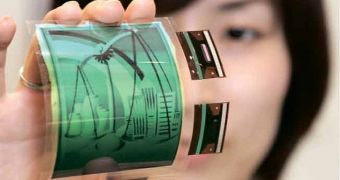A material far more elusive than Liquidmetal will be the new battleground for Apple and Samsung, according to a recent Bloomberg report. The Cupertino giant is looking for ways to create graphene-based devices that bend and fold, and it has tapped researchers in Seoul, South Korea to unlock its potential.
Without citing any sources in particular, the news agency reveals that “The potential has Samsung, Apple and Google Inc. amassing arsenals of graphene-related patents, in part because sales of so-called wearable computing devices is predicted to rise 14 fold in five years.”
Samsung is distancing itself from Apple as “the early leader in the race for intellectual property rights,” having already secured a number of patents involving graphene use in electronics.
Claire Kim, a Seoul-based analyst at Daishin Securities Co., is cited as saying, “We will someday see an era where mobile devices will truly become flexible, easily folded and unfolded, and that’s when we will need graphene.”
Indeed, graphene looks and sounds like the basis of the next technological revolution. The material is invisible to the naked eye yet 200 times stronger than steel, and a heck of a lot more conductive than most metals out there.
Because of its elasticity and other awesome properties, thin plastic displays can be coated with graphene, essentially creating flexible touch-screens.
Integrated circuitry can also be made from graphene – with a considerably smaller footprint than today's silicon-based chips – allowing for smartphones and tablets to become substantially thinner. Our handheld devices could soon be nothing more than thin sheets of plastic.
The advantages posed by the material are endless. For example, thanks to its high conductibility, it can be used to make batteries that can be fully recharged within minutes – a prospect high on the list of priorities for automotive industry players developing the next breed of electric cars. The same benefits can be brought to smartphones, tablets, and laptops, of course.
Claire Kim reportedly added that “The first companies to commercialize graphene technology in mobile devices will have an advantage over the rest of the industry.”
Finally, the report reveals that Hong Byung Hee, a professor at Seoul National University, has been tapped by Apple. The Cupertino giant appears interested in using the material in future flexible devices.
Hee, who has developed a patent for mass-producing graphene-based displays, tells Bloomberg, “Global technology companies are facing innovation limits in hardware and design, and in order to step over to the next level, they need to adopt new materials like graphene. Our key graphene technology is receiving considerable interest from firms including Apple, Samsung and even Google.”

 14 DAY TRIAL //
14 DAY TRIAL //